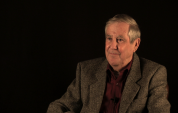9:19 | Using a captured VC to infiltrate fire bases while the crews watched was a great teaching method for Bill Crossley. The man would get inside every time, starting a flurry of activity as security measures were toughened. The next step was showing the artillerymen how to patrol, something that was lacking in their training. Part 2 of 2.
Keywords : Bill Crossley Vietnam artillery battery bamboo wire concertina Claymore security patrol tripwire mine Air Force loadmaster translator point mortar

Bill Crossley was more mature than most soldiers arriving in Vietnam, having already been an artillery officer for seven years. In charge of three batteries, he interacted with many other troops and never saw any evidence of the widespread notion that they were lacking in some way. The popular image of the indifferent Vietnam soldier is a total myth, he says.
It was all peace and quiet during the Tet armistice, but Bill Crossley's artillery battery was getting a request for fire from a remote unit. They didn't know it but that was the first rumbling of the Tet Offensive. The wave of attacks across Vietnam actually relieved some frustration on the part of American forces. They had been searching in vain for enemy to engage.
Once the Tet Offensive began, it was the "Wild, Wild West" for Bill Crossley's artillery. He had to move an entire battery forty miles in the dark, secure an unguarded bridge in Saigon, and then begin the counter attack. While it was a disaster to Walter Cronkite, the troops who had long been searching for the VC knew that they finally had them.
The Viet Cong had already done their reconnaissance on the Special Forces base. But when they attacked at midnight, they didn't know about the artillery battery that had just been deployed and dug in. Bill Crossley relates how the attackers stumbled right into heavy fire and were repelled, even though the battery ran out of ammunition and shot illumination rounds in desperation.
It was a close call. Just as Bill Crossley was getting ready for steak and beer on a much needed rest, a rocket hit the camp. As he headed for the TOC (Tactical Operations Center,) the rockets were landing right behind him. Noting the progression of hits, he knew the next one would be right on him. Then there was his friend who showered at the wrong time.
His job was to inspect artillery fire bases for security and, right away, Bill Crossley could see the problems. After unclogging supply lines for concertina wire and teaching the gun crews at the first base how to patrol, he decided he needed a better way to get their attention. That led him to a former VC sapper named Nguyen. Part 1 of 2.
Bill Crossley was always scrambling to improve security at his artillery fire bases. He sent a meteorological platoon to one battery just to get some more gun barrels in case of attack. He had also scrounged a 75mm recoilless rifle, which by pure chance wound up insuring the base against mortar attacks.
Bill Crossley explains how he prepared for counter battery fire in Vietnam. Counter battery is the response to incoming fire and the secret is to plot potential locations for the enemy to set mortars and have that data ready when an attack occurs. You can find the direction of an enemy mortar hit by examining the crater.
Artillery officer Bill Crossley had a rattling .45 and an M-16 in Vietnam and he is thankful he never fired them. He is also thankful that among all three of his gun batteries, there was only one casualty. He has something to say about the food, including the story of an irate baker and the reason he won't eat stewed tomatoes.
The 107mm rocket was a new weapon for the VC and Bill Crossley's artillery unit was the first to get hit with them. They got pretty good at finding the firing positions because, unlike mortars which fired nearly vertically, the rockets required an open space. On the Fourth of July, he realized what he should do with hundreds of captured rockets he had on hand.
There was high tech warfare in Vietnam. Sensors revealed that there were trucks on the Ho Chi Minh Trail and there was even an advanced airborne radar that found ground traffic. Bill Crossley reveals the low tech tactic they had to use to pick up slow moving ox carts.
To Bill Crossley, there was no finer example of good leadership than LTC Gene O'Grady, who was his battalion commander in Vietnam. He quietly took care of details that no one else thought of, all for the benefit of the men.
One example of LTC Gene O'Grady's leadership was his response to an incident of errant artillery fire. Bill Crossley remembers that O'Grady made him use a briefcase to look more professional as he arrived to assess the situation. Then he agreed to use the trashcan as a file for some awful paperwork.
Bill Crossley has some harsh words about the personnel policy that was in effect in Vietnam. The lack of unit cohesion was caused by the constant churn of replacements. Soldiers had to fight without training together. When his generation moved into military leadership, they made sure that would never happen again.
After explaining that his awards were no big deal, Bill Crossley relates a funny incident from one of the engagements that brought him one of them. Although it probably wasn't too funny to the brigade commander.